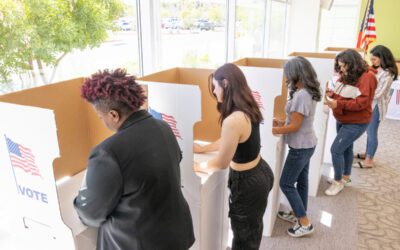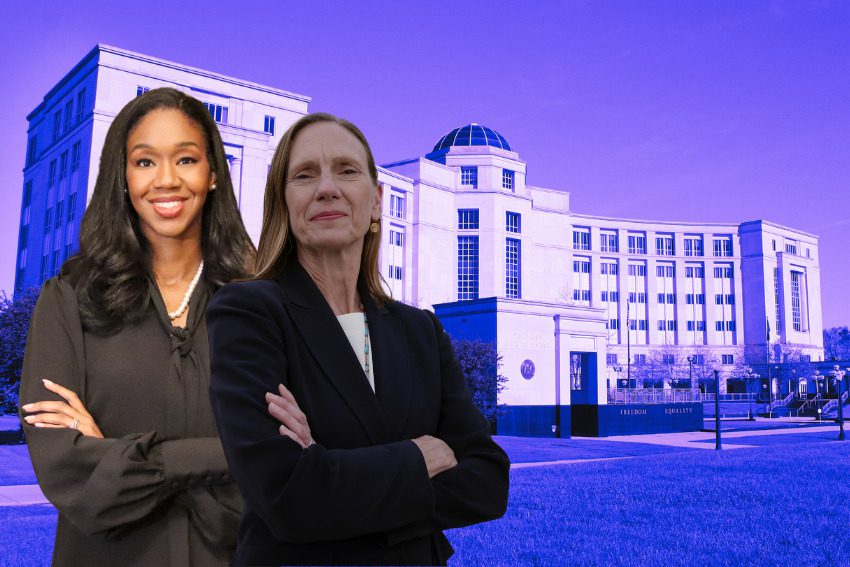
Photo Illustration
Three of the four candidates running for the state Supreme Court joined a recent panel discussion to outline their vision for justice in Michigan—but only the two Democratic-backed candidates stuck around to take questions from the media.
MICHIGAN—Three of the four candidates running for the Michigan Supreme Court this year joined a virtual forum hosted by the League of Women Voters of Michigan on Thursday—but only the two Democratic-backed candidates stuck around to field questions from the media.
Both Democratic-backed candidates, incumbent Supreme Court Justice Kyra Harris Bolden and Kimberly Ann Thomas, participated in the full 45-minute Zoom call this week, which featured questions from the League of Women Voters, as well as two questions from The ‘Gander.
Republican-backed candidate Patrick O’Grady also participated, but signed off the Zoom call before reporters could ask questions. The other Republican-backed candidate running for the Michigan Supreme Court this year, state Rep. Andrew Fink, didn’t show up to the forum at all.
Here’s the deal:
The Michigan Supreme Court race is technically nonpartisan, so candidates will appear on the ballot without a party label. But Bolden and Thomas have each been endorsed by the Michigan Democratic Party, and O’Grady and Fink have each been endorsed by the Republican Party.
Bolden will face off against O’Grady for a partial term. Thomas is running against Fink for a full, eight-year term on the Court. Every registered voter in Michigan can vote in this race, which may appear on the backside of the ballot depending on the jurisdiction in which it’s printed.
Democratic-backed justices currently hold a 4-3 majority on the Court. Republican victories could flip control of the court, while two Democratic wins would yield a 5-2 majority.
And with crucial decisions involving reproductive rights, abortion bans, gun safety laws, and election integrity making their way to state supreme courts across the country in recent years, whoever wins will likely have a hand in making some big decisions for the people of Michigan.
This week’s forum was not a debate. But it served as a relatively rare opportunity to hear directly from the candidates, who are typically reluctant to speak publicly about their personal views—namely to not appear prejudiced on matters that come before the Court.
Meet the Candidates – Kyra Harris Bolden
Before becoming the Black woman to serve on the state Supreme Court, Kyra Harris Bolden served two terms as a Democratic member of the Michigan House of Representatives and, before that, worked as a law clerk, as well as a criminal defense and civil litigation attorney.
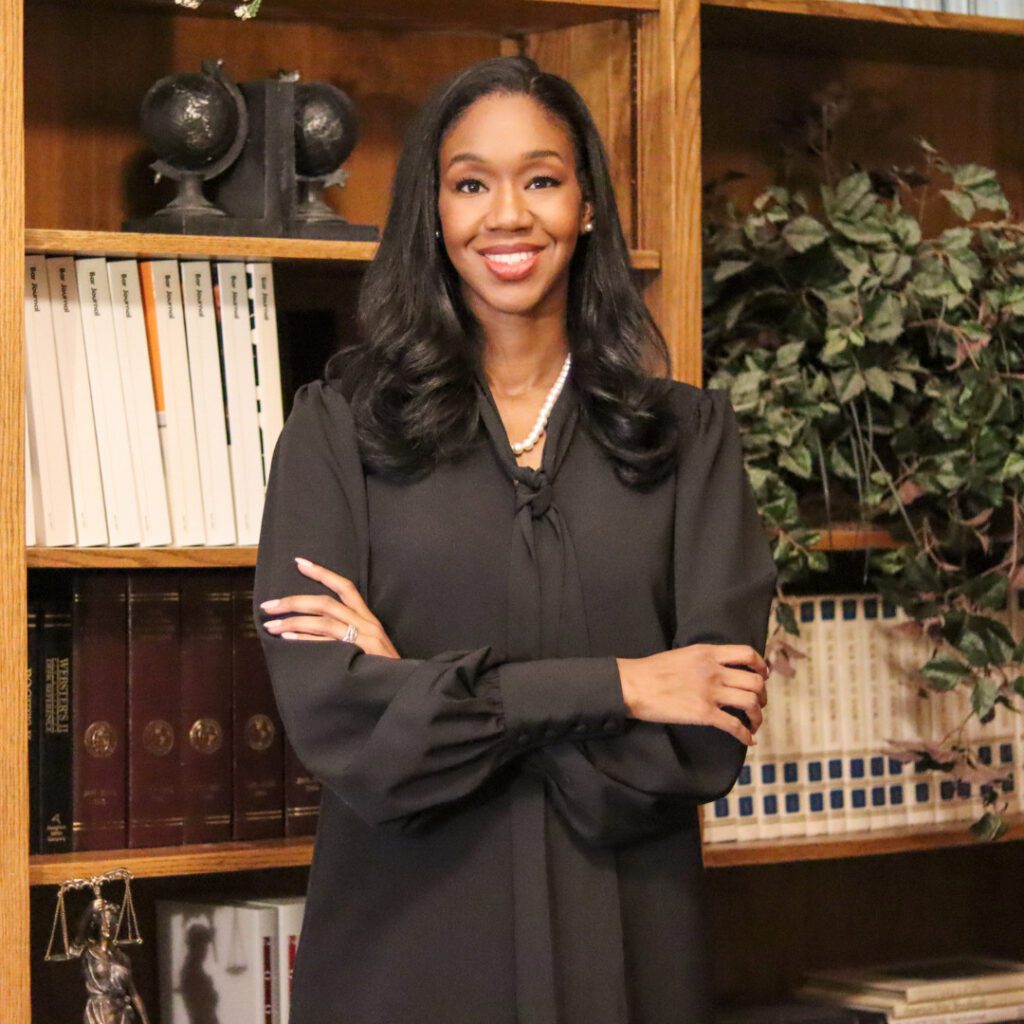
During this week’s forum, she said that her passion for justice—and the whole reason she became a lawyer to begin with—stems from her family’s own tragic history with racial violence.
In 1939, Bolden’s great-grandfather, Jesse Lee Bond, was lynched in Tennessee after he was involved in an argument with a white storeowner and his son. He was ultimately shot to death, castrated, and his body was dragged from behind a truck and staked to a nearby riverbed.
No one was ever held accountable for his death.
“I was moved by that story of my family history and I wanted families to see justice in a way that my family had not seen justice,” Bolden said at this week’s forum. “I was very compelled to make sure that I was a part of the justice system on the right side of justice. And so I went to law school to make sure that I could be a part of the change that I wished to see in the world.”
Bolden also said that she took inspiration from former Michigan Circuit Court Judge John A. Murphy, who was elected to the Third Circuit Court bench in 1986 and was the longest-serving judge in Michigan and the longest-serving state-elected African American judge in the state.
“When I called [Murphy] to tell him that I was running for Michigan Supreme Court, the first thing he said was, that’s perfect for you,” Bolden said. “He didn’t just treat me like a staffer, he treated me as someone whose voice was valued. I found so much inspiration in that mentorship and for him to essentially bless my running for Michigan Supreme Court really meant a lot to me.”
When asked about her judicial philosophy, Bolden said that she doesn’t have one—and that coming into a case with a predetermined outcome would be a “disservice” to Michiganders.
“It’s important to take all the information that you have available to you, talk to different people, listen to oral arguments, and be very, very thoughtful and considerate when making these very important decisions for Michiganders,” Bolden said. “And that’s how I approach each and every case—with an openness that each case is not the same. Also knowing that I have something to learn with every single case and that each case requires thoughtfulness and consideration for its uniqueness. … Having been a legislator before, and knowing how the sausage is made, has really informed my viewpoint of how I approach cases at the Michigan Supreme Court level.”
Bolden also voiced a desire to ensure the justice system works fairly for all Michiganders.
“We don’t want to live in a society where your justice depends upon how much money is in your pocket or [your] zip code. We want to make sure that the justice system is applied equally,” Bolden said. “We want to make sure that people feel that they are getting a fair shake.”
Meet the Candidates – Kimberly Ann Thomas
Kimberly Ann Thomas is a law professor at the University of Michigan Law School, which is routinely ranked as one of the top law schools in the country. She received her undergraduate degree from the University of Maryland and her law degree from Harvard Law School.
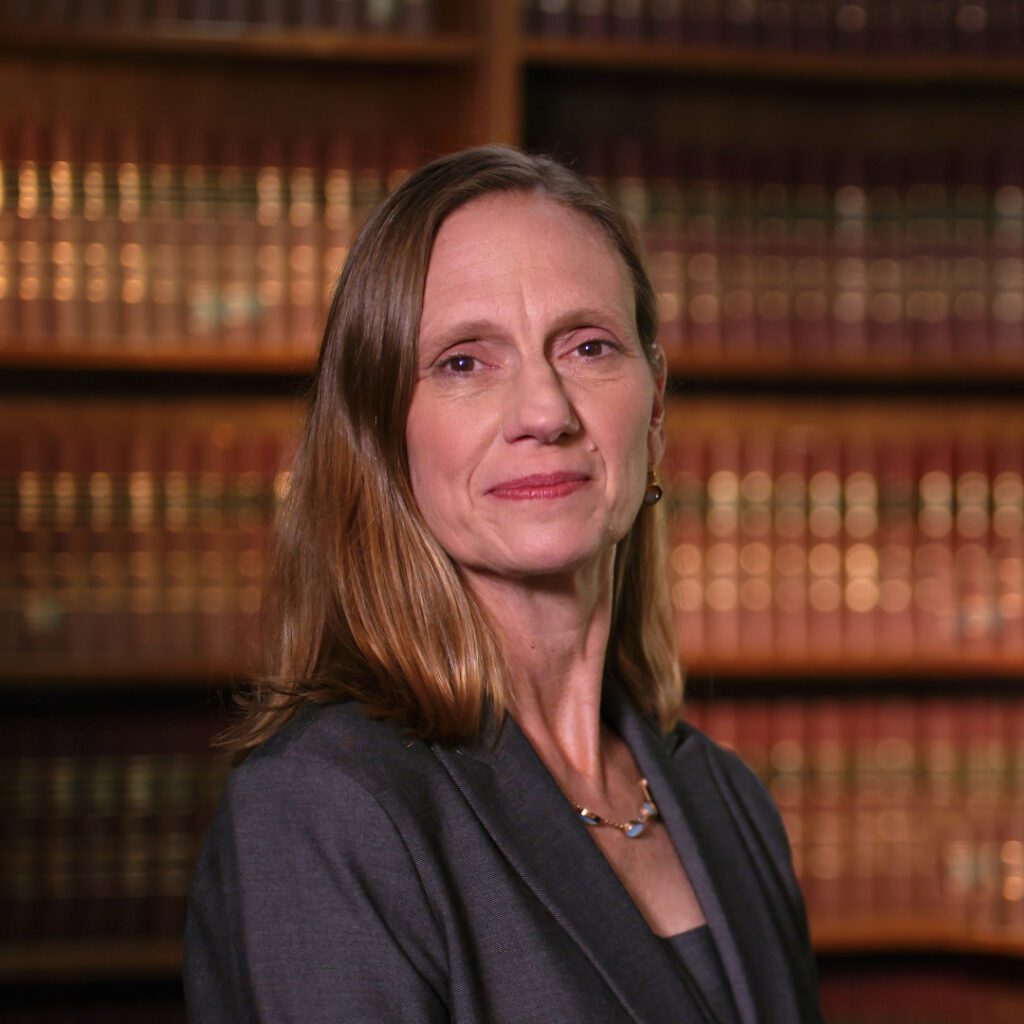
During this week’s forum, she explained she wants to serve on the state Supreme Court because she “cares deeply about the quality of justice the people across our state receive.”
“And I’m an experienced trial and appellate lawyer,” Thomas said. “I understand that Michiganders deserve a court system that we can trust, one that is fair and treats every person with dignity and respect. … I wanted to go to law school and serve people of my state.”
Before joining the faculty at the University of Michigan in 2003, Thomas worked as a trial attorney in the city of Philadelphia. She also served as a former editorial board member of the Clinical Law Review, which is devoted to issues of lawyering theory and clinical legal education.
As a Fulbright Scholar award recipient, Thomas has also taught law in Ireland and worked on curriculum development in Jordan, Egypt, and Turkey. In 2013, she was also among several attorneys honored with the Justice for All award from Criminal Defense Attorneys of Michigan.
When asked about her judicial philosophy, Thomas said that it’s all based on experience in the classroom—and that she would expect the same thing that she expects from her law students.
“You start with the text of the law or the text of the Constitution, know all of the preceding cases and the precedent, adhere to those, and apply the law fairly and do 100% of your research,” Thomas said. “Making sure that we have thorough and careful decisions that act with integrity is what I demand of my students and what I would expect of myself on the Supreme Court.”
She added: “As a law professor, my job is seeing things from all sides and making sure I understand all sides of an issue and that I’m pushing others to see all sides of an issue.”
Meet the Candidates – Patrick O’Grady
Patrick O’Grady is a longtime 15th Circuit Court judge in Branch County, a US Army Reserve veteran, a former Michigan State Police trooper, and a former assistant Branch County prosecutor who claims to have presided over 14,000 cases during his time on the bench.
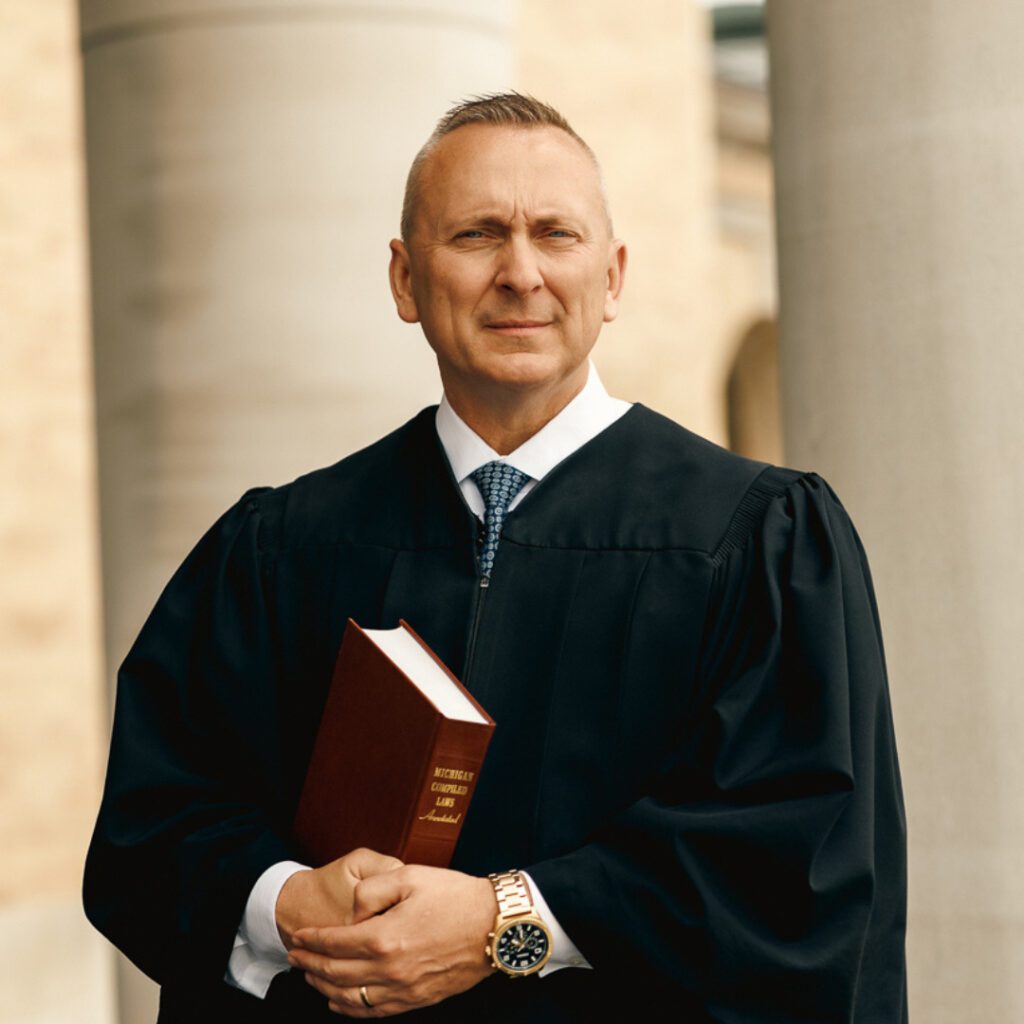
Since Fink didn’t show up, he was also the only Republican-backed candidate at the forum.
At previous events, O’Grady has introduced himself as a Christian man who, if elected, would adhere to a strict, textualist interpretation of the state Constitution as a “rule of law judge.” But this week, he focused largely on his transition from being a police officer to becoming a judge.
“I realized both answering the 911 calls as a trooper and as a prosecutor, what service meant when you see people in their highest need. So my story is very unique. It’s from the road as a trooper through the courtroom as a prosecutor, and also to the bench,” O’Grady said.
When asked about his judicial philosophy, O’Grady described a “textualist” approach to interpreting the law—which is the same mentality that guided the majority on the US Supreme Court that overturned Roe v. Wade and peeled back the right to abortion for millions of women.
“You simply have to apply the law and the rule of law is what it is. I think the textual interpretation of both the constitution and also statutory structure needs to be applied,” O’Grady said. “It does come to the rule of law. It does come to that very textual application.”
During a recent debate, O’Grady spoke at length about how Michigan was formed “pursuant to almighty God.” But this week, he logged off the call early without mentioning his religious views.
(Sort of) Meet the Candidates – Andrew Fink
State Rep. Andrew Fink (R-Adams Township) opted against running for a third term in the state Legislature this year to instead pursue a Republican bid for the Michigan Supreme Court. He didn’t respond to an email from The ‘Gander inquiring about his absence from this week’s forum.
Officials at the League of Women Voters Michigan also said Fink had an opportunity to provide a written statement for them to share during this week’s forum, but opted not to submit one.
What sets the candidates apart?
All three candidates who participated in the forum have kept relatively quiet about their personal views and opinions on a wide array of important legal issues that may come before the Court.
After all, Michigan’s Code of Judicial Conduct requires that they—and all other judicial candidates—avoid “impropriety and the appearance of impropriety,” so as not to appear biased on high-stakes issues like abortion access, LGBTQ rights, gun safety measures and more.
That code of conduct is designed to create an impartial justice system. But it can also make it challenging for voters to identify which candidates align most closely with their personal values.
So, for our first question, we asked each of the candidates to describe what sets them apart from their opponent in this year’s election. Here’s what they said, in their own words:
Bolden: “I think this accessibility piece really sets us apart. We have both traveled across the state of Michigan meeting voters where they are and trying to earn every single vote that we can. We are very active on social media. We are not afraid to do interviews. And so I think that that sets us apart because you want justices with accessibility and transparency. This is a service position, and so you want to make sure that you have full confidence in making sure that you know who you’re voting for. I think that myself and Professor Thomas have been incredibly accessible during this term. You can go to boldenandthomas.com to find out more information.”
Thomas: “I believe that I am the best candidate for the eight-year term, given that I’ve been an attorney for 25 years, that I’ve litigated cases throughout our state court system. … And because I’m a law professor at the University of Michigan Law School, I also understand how the law works. I’ve worked internationally as a legal expert for the American Bar Association’s Rule of Law initiative and understand how important it is that we have courts that are fair and impartial and that work for the people of this state. And so bringing that expertise and that experience is why I believe that I am the best candidate for the eight-year term.”
Will they accept the election results?
We also asked whether each of the candidates would be willing to accept the results of this year’s election—regardless of whether or not Michiganders decide to put them on the bench.
Both Bolden and Thomas emphatically agreed to accept this year’s results.
O’Grady wasn’t around to answer the question, but later emailed The ‘Gander to say he would “be willing to accept the results of the election, win or lose, provided there are not egregious issues surrounding it.”
“I am always concerned with election integrity since there have historically been issues,” he said. “I am hopeful that the election happens with no major issues, and we can all accept the results of the people quickly.”
An email sent to Fink’s campaign hasn’t been returned.
“This very important race, it usually goes under the radar,” Bolden told The ‘Gander. “But we make really important decisions, and it’s really important to know who your justices of the Michigan Supreme Court are, and that you’re picking the best one to represent you.”
A full recording of the candidate forum is available online.
READ MORE: 10 cases that show how the Michigan Supreme Court shapes your rights
For the latest Michigan news, follow The ‘Gander on Twitter.
Follow Political Correspondent Kyle Kaminski here.
Support Our Cause
Thank you for taking the time to read our work. Before you go, we hope you'll consider supporting our values-driven journalism, which has always strived to make clear what's really at stake for Michiganders and our future.
Since day one, our goal here at The 'Gander has always been to empower people across the state with fact-based news and information. We believe that when people are armed with knowledge about what's happening in their local, state, and federal governments—including who is working on their behalf and who is actively trying to block efforts aimed at improving the daily lives of Michigan families—they will be inspired to become civically engaged.

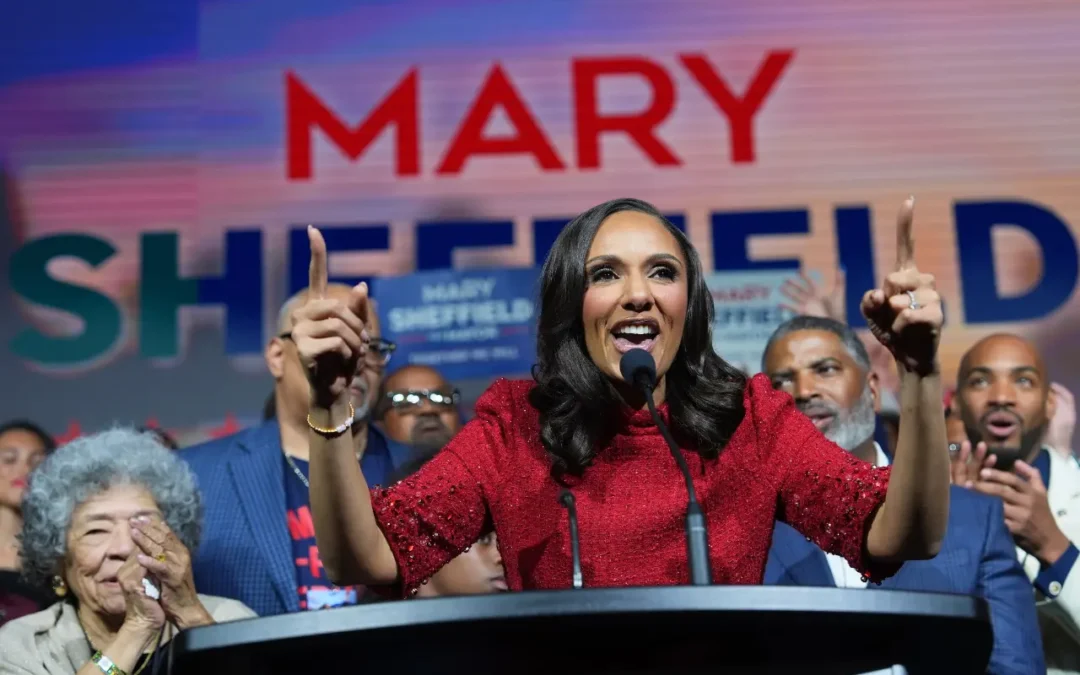
City Council President Mary Sheffield wins election to become Detroit’s first female mayor
DETROIT—City Council President Mary Sheffield will be Detroit's newest mayor and the first woman to lead the city. Sheffield defeated popular...
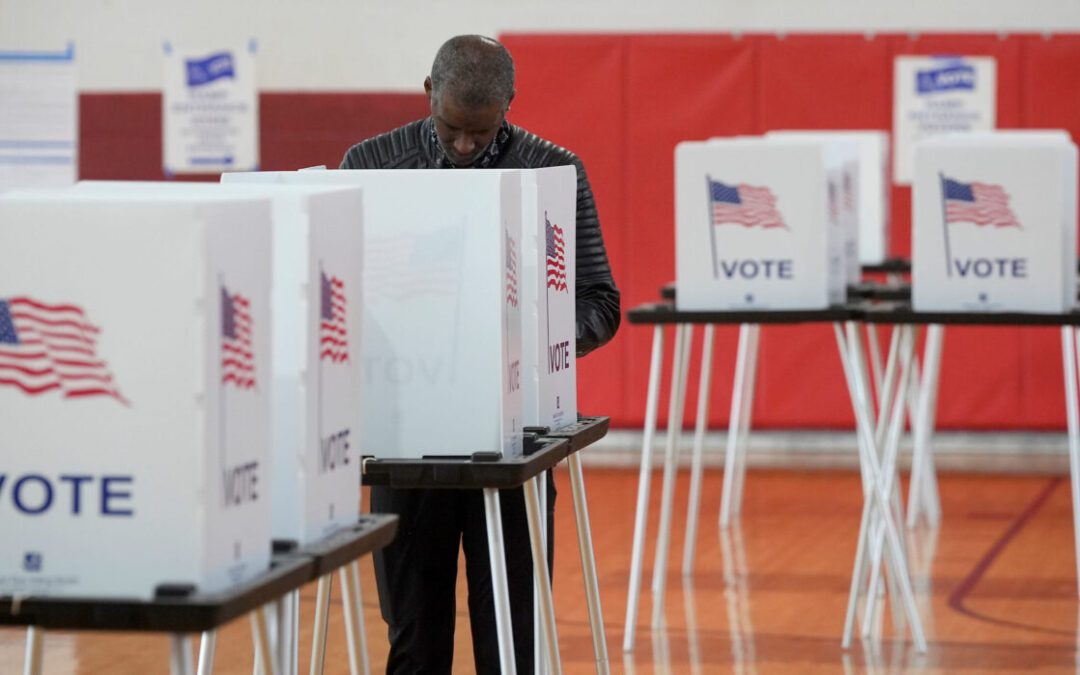
When is Election Day 2025? What to know, how to find your polling place, who’s on ballot
On Tuesday, Nov. 4, 2025, Detroiters will select a new mayor, fill two open seats on the Detroit City Council, decide whether to re-elect or replace...
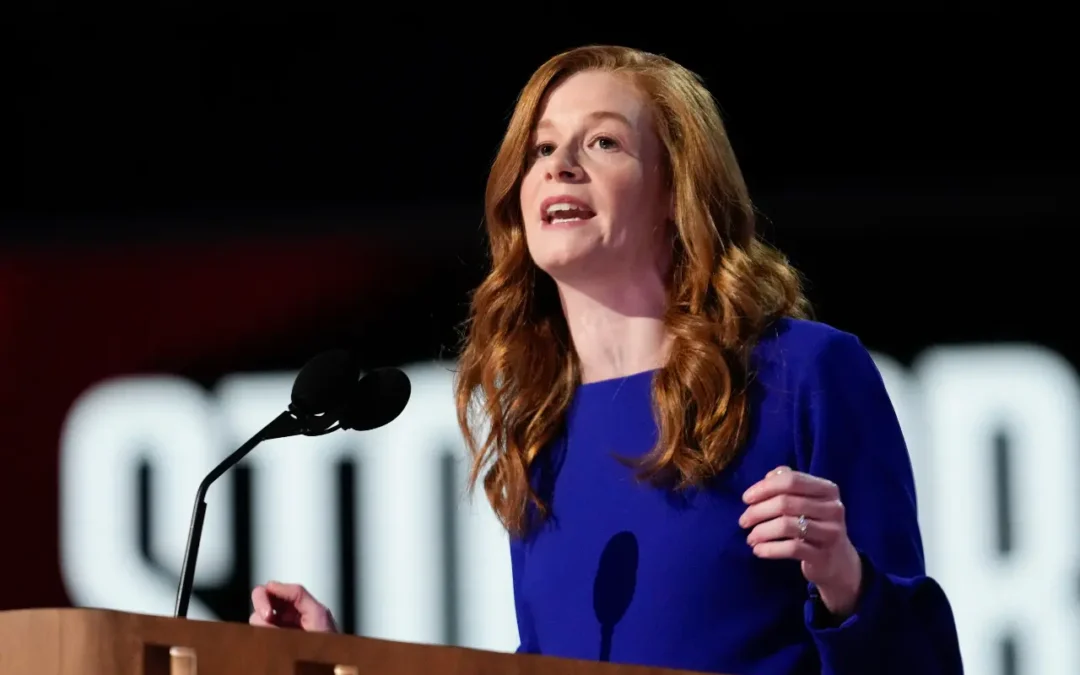
McMorrow clarifies stance on Gaza, joins Michigan Dems calling situation a genocide
BY BEN SOLIS, MICHIGAN ADVANCE MICHIGAN—Yet another Michigan Democratic candidate seeking statewide office has called the situation in Gaza and the...

Mary Sheffield to face Solomon Kinloch in November election for Detroit mayor
DETROIT—The race for Detroit's next mayor is set to pit a longtime City Council member against a popular pastor, after council President Mary...
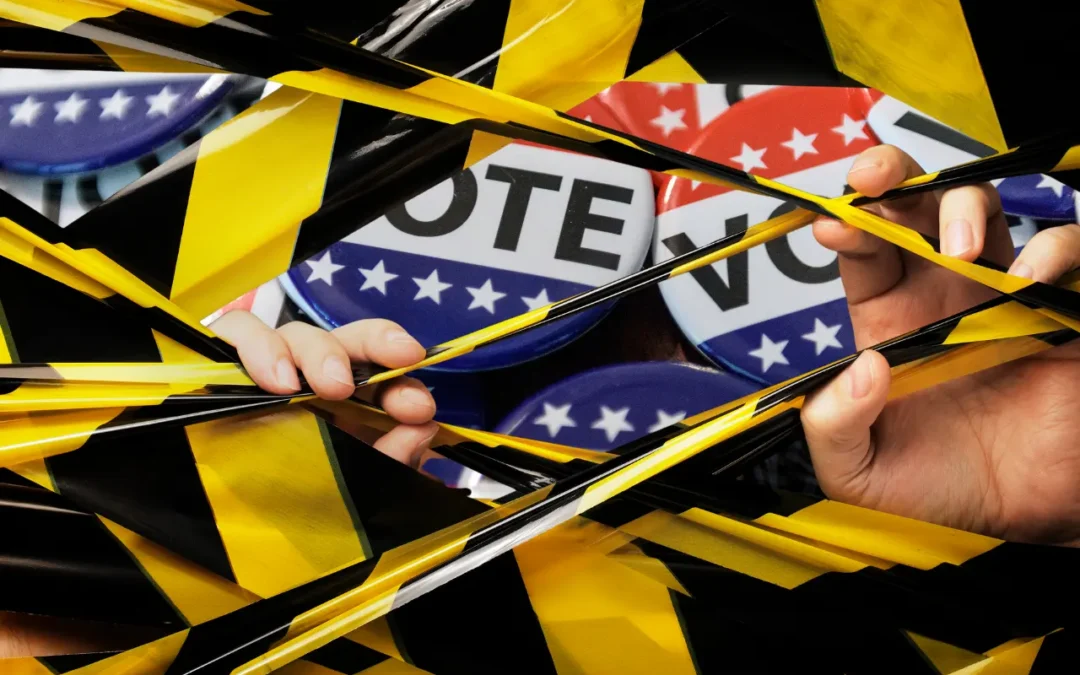
Decline to sign: Michigan voting rights groups sound alarm on petition drive ‘trap’
With signature gatherers hitting sidewalks across Michigan, groups are sounding the alarm on petitions they say would disenfranchise voters under...





